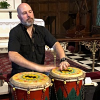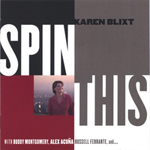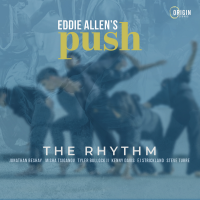Home » Jazz Articles » Interview » Alvin Fielder: It's About Time
Alvin Fielder: It's About Time
AF: Clyde Kerr is another great trumpet player. On No Compromise![Prescription/ Danjor, with Kidd Jordan, Fielder, Kent Jordan a.o.], Clyde is at the top of his game. Some of the music was recorded in 1977, and on the CD we've added four duo tracks. There's a trumpet and tenor duet, Kidd and I (with Kidd on alto), and there's a bass and cello duet that's a monster, with London Branch and Ramsey McLean. That was the only time Ramsey played with us. It's a beautiful recording that was done in Meridian. We've got more things with Muhal, Clifford Jordan, Joe Dennis from Atlanta, London Branch on bass, and we were playing what we called "From Fats to Cecil"—Fats Waller, Duke Ellington, Ornette Coleman and Cecil Taylor. This was in the 1970s.
Now, that was just before I met Kidd, because Clifford Jordan introduced us. I was working in his quartet at the time and he'd done a clinic with Billy Higgins, Stanley Cowell and Bill Lee down in New Orleans. He came back and told me, "there was this saxophonist down there getting ready to quit playing. We've got to go down there, talk to him, and get him to keep playing!" So he sent me down there and I took London Branch down, and London and I couldn't find him. We looked everywhere and as we were leaving town we saw a cat on the street. He didn't have his horn, but London said "I bet that's Kidd Jordan." We stopped the man, and it was him! Kidd went and got his horn and we went over to his school and played till nine or ten at night. We did that about every weekend after that and a group was formed.
I have an original tape of the first time we played, and every time we practice I record all of them. That was how it was, man, and we were brought together by Clifford Jordan.
 AAJ: How did you meet Clifford Jordan? In Chicago?
AAJ: How did you meet Clifford Jordan? In Chicago?
AF: No, we had a nonprofit organization down here called Black Arts Music Design and it was started by John Rees, who had started it on the west coast, out in Berkeley. He wanted to put the music in schools and such, and he had this group where he'd use Smiley Winters and Ed Kelly and people like that. He moved back to Mississippi and kept the organization; I moved back in '69, he moved back in '70 and I probably met him in '71.
Somehow we met—somebody told me "there's this cat over in Jackson who really loves jazz"—and I probably didn't believe them and went over and met John, and right away he was so hip, Trane had stayed at his crib and he had all these beautiful stories. I was like "why don't we do something?" So we started bringing in guys, went to the National Endowment for the Arts and got a grant, and we were the only group in Mississippi doing that. We brought in Dexter Gordon, Benny Carter, Woody Shaw, Clifford Jordan, Donald Byrd and I was supposed to put together the rhythm section. Dexter brought his own group with Eddie Gladden and George Cables, so I put together a ten-piece group that comprised musicians from Jackson and New Orleans.
AAJ: It sounds like there's a strong connection between those two cities.
AF: You know, at the time I was the only Mississippian working down there. Now, there was a tenor player down here at one time named Ronnie Wesley, and he brought in Ronnie Mathews to play. We had a group called Mobitra, where we played Monk, Bird and Trane. Ronnie Mathews played down here a couple of times and said "I've got to bring this tenor player back to New York—he's bad!" But he was a schoolteacher and had a family, and he stayed. One day coming home from school, he fell asleep driving and ran into the back of a truck.
AAJ: What a shame.
AF: But I have several tapes of that group, and it was burning—man! That was one of the baddest groups ever to come out of this town. We were playing Sonny Rollins, Bird, Monk, everybody—and this was a trio of tenor, bass and drums. All the guys from New York would come through, "you want to come up on stage and play?" Ronnie would play and cats would pack their horns up! Beautiful tenor player...
There were so many combinations; we were using cats from Atlanta like Joe Dennis and Howard Nicholson, we were using people from Birmingham, Memphis... There's a tenor player there by the name of Herman Green. He played with Elvin, played with everybody, and he's still up there. Right now there's a pianist up there by the name of Chris Parker, he's relatively young but he can play, knows the bebop repertoire beautifully, all those Elmo Hope tunes and Monk. Then there's Joel Futterman and Kidd, and that particular group has been together about six years, and that's been a great group. I have a lot of respect for Joel and we love Kidd and Kidd loves him. It's the perfect group right there. We can just sit down and do nothing, and that group can swing.
 AAJ: But it seems to me that there's quite a community of people in the South that just hasn't been documented correctly.
AAJ: But it seems to me that there's quite a community of people in the South that just hasn't been documented correctly.
AF: Not really. There's Kidd and Clyde, and we talk a lot because we're all lonely. I don't have anybody to play with in Mississippi. Kidd has practically nobody to play with in Louisiana. Joel has nobody to play with up in Virginia. Chris Parker has nobody to play with, really, in Memphis. It's that way—you don't have people and it's lonely. How many creative musicians do you have in Houston, really?
AAJ: I don't know because I've only been here a week and a half. Minneapolis, where I came from, has a lot, which I wasn't expecting and which was a boon.
AF: But it's close to Chicago and Detroit. There's other cities around. I don't have anybody else around who is actually trying to play this music. There's a bassist on the west coast that I made a lot of records with, Henry Franklin, a beautiful player—that cat can play!
I did a double quartet thing with him and Dennis Gonzalez, Marlon Jordan, Charles Brackeen, Kidd, Malachi Favors was on it, and this cat can play! I did a gig with him and Frank Lowe and Dennis Gonzalez, and I had to really prepare! I wrote a couple of tunes, Frank wrote a couple of tunes, Dennis wrote some, and one that I wrote was dedicated to Max Roach and Blackwell, called "Maxwell." We were at the studio and had to take it down one. We hit the playback and I was like, "wait a minute, this cat sounds like the drummer and I sound like the bassist!" We had to do it again [laughs] and I had to rethink my own tunes, man, because he was playing all over that thing!
AAJ: And you have to travel to get those experiences.
AF: I was introduced to him by Dennis Gonzalez. He was coming to Dallas a lot, so Dennis said "we'll use him so we don't have to pay for Malachi's airfares." This cat, man—Henry Franklin and William Parker are probably my two favorite bass players. If Mal was still alive... with William, man, it's wide open. You can swing, you can play as free as you want, and you don't have to worry about a thing because he's bad no matter what. It's just his rhythm—you can play fast, then turn around and play real slow, but it still sounds fast! You can play slow and he plays fast. Joel Futterman has that thing, as does Kidd, and it's just a natural feeling. It's just a natural rhythm, and it allows me to open up. If I'm playing "Giant Steps" I have to play one way; if I play "Stable Mates," I have to play it another, but with Kidd I can turn it around.
I don't know if you noticed, but with Kidd I was playing little nursery rhymes behind him—"Mary Had a Little Lamb," "Merry Christmas," stuff like this—it just frees you up. One time I was playing an Elvin thing, and then I was playing a nine and a seven. I have all of these little rhythms and time signatures so they all sound like four and that don't mean nothin' to Kidd, William or Joel. If somebody else was up there, it would matter. There are all these little melodies I'm playing and Kidd has all these little tunes he was playing in rhythm and blues bands, Little Walter, Ray Charles and people like that.

AAJ: But he's taking it somewhere else and taking something else out of it, too.
AF: But you know, that's an American thing. You can take rhythm and blues, folk things, you know, like Albert Ayler's "Ghosts," that's a cowboy song.
AAJ: And he played with Scandinavian musicians and learned tunes from Sweden.
AF: Of course, it sounds like something from Texas to me, you know. When I played with Roscoe, we used a Latin thing. When I played with Kalaparusha, I played little nursery rhyme things. Everything's useful, it just depends on the person.
AAJ: It's interesting because in any other music, if it were not the three or four of you, neither piece would work on its own.
AF: The thing is, man, I try to set up something that's gonna swing even if it's not a swingin' thing. Everything I play is around that cymbal pattern; it may be broken up but that's what swing is about, believe it or not, it's that pattern. As much as I slow it down, I'm always using that particular thing, because that's like the jazz clave and the American clave.
AAJ: It's leaner and faster.
AF: That's American. People talk about Latin jazz or European jazz, but we play American music. I can play these other things, but it's not me—I wasn't raised around it, you know. There's too much in American music to be dealing with something else, I think.
AAJ: Well, some of those things that are quintessentially American are circumvented by other structures —
AF: When you think of what most of the music's creators have done, Charlie Parker wasn't known as a writer, but a player. Coleman Hawkins, John Coltrane, Sonny Rollins—these were players, improvisers. The swing is always there—like Monk—and they dealt with what they dealt with. Those changes in the music from Cecil Taylor and Ornette Coleman, it all had that swing. You could put a tinka-ting tinka- ting tinka-ting against it, and it would swing!
AAJ: Sunny Murray had his Acoustical Swing Unit in the late '60s, and it does swing as dense as it gets—you can tap your foot to it. You can tap both feet and in many different directions, but it's still a tap.
AF: Yeah, that's right. Max once said "all music is in 1/1 time," which is quarter-notes. You can think of three—one-two-three, one-two-three—and I think of ping-pong. Ping-pong, ping-pong—but when you're playing two beats in a three-beat phrase, it's a quarter-note thing. It loosens it up, though [gives audio example].
 AAJ: You can fit a lot of things into that space.
AAJ: You can fit a lot of things into that space.
AF: In the space, that's it. You have more space to deal with. Elvin would play triplets, but he could do it in four or three or whatever. Most musicians prior to Elvin could only deal with quarter notes; Elvin just loosened it up. I think of creative music as an extension of bebop. When you think of bebop, that music revolutionized the whole world of TV music, movie music, Broadway music—all of that came out of bebop, the extension of chords and rhythms and so forth.
AAJ: But my attraction to it has a lot to do with these spaces—whether to fill them or not, and how to do it—there is a constant motion whether or not it's perceptible as being fast or slow. Like I said, there are so many directions that one can tap one's feet.
AF: Everybody has a different rhythm; everybody has a different body rhythm. In the symphony, you practice to get that. In jazz, you practice the music but still it comes from within you, it's a spiritual thing. And that's the thing about America. We tend to be a little more spiritual, I think, than most other people. The people of East India, for example, they talk about it and play their ragas, but it's not like this music. People are knocked out by certain other music, but I'm knocked out by Bird, Bud Powell, Cecil, William Parker, and Duke Ellington.
AAJ: It's often said that in Western art music, there's classical music and jazz. I've never had much attraction myself to through-composed music.
AF: Well, I listen to Mahler and Takemitsu, and I love classical music and European music, and I love the way the Japanese write music too. But it's different stuff. I listen to a lot of classical music, but jazz—American music makes me dance and I can't dance. Trane makes me move, and Elvin makes me move! They really do—and I never learned to dance (I never wanted to learn), but when I hear Monk tunes, I automatically jump up!
[Author's Note: Thanks to Alvin Fielder and Dave Dove of Nameless Sound for making this interview possible.]
class="f-right">
Alvin Fielder Trio, A Measure of Vision (Clean Feed, 2007)
Futterman/Fielder/Levin, Live at the Blue Monk (Charles Lester Music, 2006)
M41 (Fielder/Parker/Lamb), The Orbit of Sirius (M41, 2005)
Jordan/Futterman/Fielder, Live at the Tampere Jazz Happening 2000 (Charles Lester Music, 2000)
Jordan/Futterman/Parker/Fielder, New Orleans Festival Suite (Silkheart, 1999)
Improvisational Arts Quintet, No Compromise! (Danjor/Prescription, 1977/1983/2003)
Roscoe Mitchell Sextet, Sound (Delmark, 1966)
Photo Credits
Workshop Photos Courtesy of Nameless Sound
Concert Photos: Frank Rubolino
Tags
PREVIOUS / NEXT
Support All About Jazz
 All About Jazz has been a pillar of jazz since 1995, championing it as an art form and, more importantly, supporting the musicians who make it. Our enduring commitment has made "AAJ" one of the most culturally important websites of its kind, read by hundreds of thousands of fans, musicians and industry figures every month.
All About Jazz has been a pillar of jazz since 1995, championing it as an art form and, more importantly, supporting the musicians who make it. Our enduring commitment has made "AAJ" one of the most culturally important websites of its kind, read by hundreds of thousands of fans, musicians and industry figures every month.

























